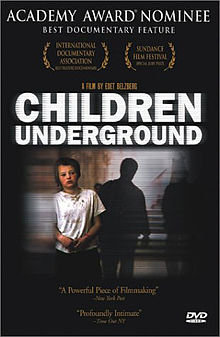- Children Underground
-
Children Underground 
DVD coverDirected by Edet Belzberg Produced by Edet Belzberg Starring Cristina Ionescu
Mihai Alexandru TudoseMusic by Joel Goodman Cinematography Wolfgang Held Editing by Jonathan Oppenheim Distributed by Childhope International Release date(s) 19 September 2001 Running time 104 minutes Language Romanian Children Underground is a 2001 documentary film directed by Edet Belzberg.
Homeless children are the casualties of Romania's recent history. In an effort to increase the nation's work force, former communist leader Nicolae Ceauşescu outlawed contraception and abortion in 1966. Thousands of unwanted children were placed in state orphanages, where they faced terrible conditions. With the fall of Communism, many children moved onto the streets. Some were from the orphanages. Others were runways from impoverished families. Today there are 20,000 children living on the streets. The resources for sheltering these homeless youths are severely limited.
Children Underground follows the story of five street children, aged eight to sixteen who live in a subway station in Bucharest, Romania. The street kids are encountered daily by commuting adults, who pass them by in the station as they starve, swindle, and steal, all while searching desperately for a fresh can of paint to get high with.
Belzberg and her cameraman, Wolfgang Held, maintain their distance as the kids panhandle, fight and sleep on cardboard boxes, either on the train platforms or the public parks above ground, watching dispassionately as the youngsters inhale Aurolac, a noxious silver paint with intoxicating fumes, from plastic bags. In a slightly uplifting coda, Belzberg and crew return a year later to find that a police sweep of the Victoriei has dispersed the children; some landed in state-funded homes, while others simply moved on to one of the many abandoned construction sites that dot the city, ironic symbols of a shining future that never arrived. Belzberg steers away from any discussion of the rampant sexual exploitation of these young children, or the fact that one of the biggest dangers they face are STDs, including AIDS, but the urban hell she presents is shattering enough. Homelessness is all too familiar to many inhabitants of the world's wealthiest cities, but rarely has the situation seemed so hopeless, or its victims so desperate
One of the children director Belzberg follows is Cristina Ionescu. At first this child may seem to be a young man, but you later find out that girls have to become hard and boyish in order to survive. This is also very apparent with another child named, Violeta 'Macarena' Rosu, who is also a girl. The nickname 'Macarena' derives from the song "Macarena", her favorite. Three other children, Mihai Tudose, and brother and sister Ana and Marian, are also profiled.
The film explores the lives of these children, who are shown fighting, abusing themselves, and becoming addicted to inhaling a colorant used in chroming called Aurolac. The filmmakers follow Mihai to his family's home in the town of Constanța. A similar scene films Ana and Marian as they visit their home, which is also outside Bucharest.
Contents
Street Children Profiles
Cristina Ionescu: Aged 16, spent her young life in an orphanage where she experienced abuse and beatings. She left the orphanage at age 11 in favor of the streets when they tried to put her in a mental institution. Cristina took on a boyish appearance in order to appear tough, as street girls often face hardships. Cristina is the leader of the subway kids.
Mihai Alexandre Tudose: Aged 11, ran away from home at age 8. Both parents drank and his father was abusive. He misses his sister and mother and feels guilt for leaving them. He wishes to have a skill in life, to own a home and go to school. He refuses to beg like the other children and instead helps shopkeepers stock shelves for payment.
Violeta 'Macarena' Rosu: Aged 14, lived at the same orphanage as Cristina. Christina protects Macarena who is quiet and submissive. She is addicted to Aurolac Paint more so than the other children. She prefers sniffing paint over food. Macarena doesn’t know her real name, her parents or her birthday. The nickname 'Macarena' derives from the song "Macarena", her favourite, which she loves to dance to.
Ana Turturica: Aged 10, ran away from impoverish conditions at home without electricity, food or clothes. She refuses to discuss her home life and says her family love her and she loves them but it's better this way. After running away, she later returns home, taking her younger brother Marian to stay with her on the streets. Her stepfather attempts to take them home twice. Ana is very troubled.
Marian Turturica: Aged 8, is Ana's younger brother. He doesn’t like life on the streets and sticks close by his sister's side. He cuts himself and shows signs of emotional suffering.
Prizes and awards
The film has won the Special Jury Prize at the 2001 Sundance Film Festival. It was nominated for the Academy Award for Best documentary feature.[1]
References
- ^ "NY Times: Children Underground". NY Times. http://movies.nytimes.com/movie/237110/Children-Underground/details. Retrieved 2008-11-23.
External links
Categories:- Romanian-language films
- 2001 films
- 2000s documentary films
- American films
- American documentary films
- Sundance Film Festival award winners
- Documentary films about child abuse
- Street children
Wikimedia Foundation. 2010.
